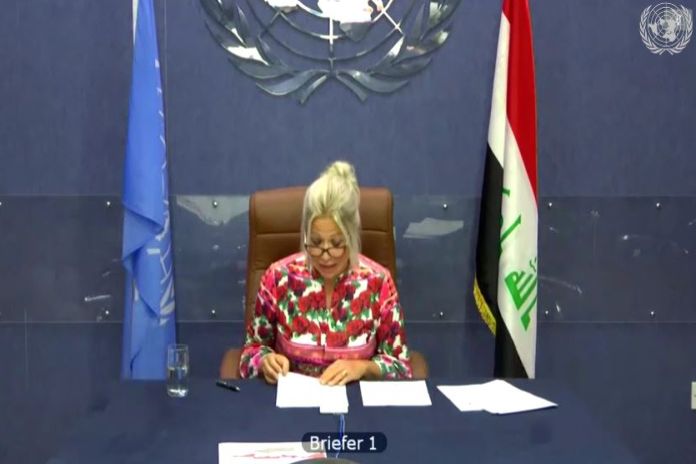
NEW YORK, USA – The COVID-19 pandemic is aggravating deep-rooted economic, social and political challenges in Iraq, but elections in 2021 – if credible – could open a new chapter for the Middle East nation after years of conflict and strife, the UN’s top official in the country said Wednesday.
Briefing the Security Council via video-teleconference, Jeanine Hennis-Plasschaeret said that for important – and painful – reforms to take root, Iraq’s political class must unite and put the nation’s interests first in order to unlock a brighter future for all its citizens.
“As I’ve said before: an environment that promotes inclusive growth and employment remains the best remedy against unrest, conflict and external interference,” said Hennis-Passchaeret, who heads the UN Assistance Mission for Iraq (UNAMI).
Presenting the secretary-general’s latest reports on UNAMI and on Kuwaitis and third-country nationals still missing since the 1990 Gulf War, she said that poverty in Iraq has grown by more than ten percent in recent months, with one in three Iraqis living below the poverty line.
Iraq in the ‘eye of multiple storms’
More than eleven million school and university students have seen their studies disrupted by the pandemic, while gender-based violence has doubled amid dwindling options for victims to seek assistance and shelter, she said.
Iraq’s economy is meanwhile expected to contract by 9.7 percent in GDP terms as oil revenues – severely impacted by a global crash in oil prices – have been cut by nearly half. Corruption remains endemic and the private sector has been particularly hard hit by job losses and reduced income.
Dangers meanwhile persist for humanitarian workers in certain areas, as seen earlier in the day when a UN World Food Programme (WFP) convoy encountered an improvised explosive device on the Mosul-Erbil road in Ninewa governorate, she said. One WFP staff member was injured in the blast.
Hennis-Passchaeret acknowledged that the government – led by prime minister Mustafa al-Kadhimi – is “undoubtedly operating in the eye of multiple storms at once,” even if the pandemic has somewhat muted social unrest.
Early moves by the government towards greater accountability, more robust support for freedom and assembly, and a tangible commitment to justice are encouraging, she said, adding however that more action is needed – including investigations into deadly attacks on activists and human rights defenders.
Short-sighted, zero-sum politics persist
“Oblivious partisanship and short-sighted zero-sum politics continue to be major obstacles for progress, but to be clear, no party, person or entity must be allowed to hijack the legitimate demands of the Iraqi people,” she said.
She also pointed out that the government – operating in a challenging geopolitical environment – is giving priority in its foreign affairs to State-to-State dialogue and relationship building.
“I sincerely hope that Iraq will be given further room to focus on its domestic resilience, instead of being used as a venue for different power competitions,” she added.
Upcoming elections
On elections, Hennis-Passchaeret – who is also the Secretary-General’s Special Representative for Iraq – said that June 6, 2021 has been announced as the date that Iraqis will return to the polls.
She stressed, however, that parliament has yet to resolve crucial questions about the apportionment of legislative seats and the delineation of constituencies. Sorting out such details must be based on technical considerations, not partisanship, she declared.
Equally important, she said, the Independent High Electoral Commission (IHEC) must be strengthened and freed from the grip of political pressure, particularly in the selection of electoral personnel and developing voting procedures.
She added that UNAMI stands ready to help the Commission develop a comprehensive voter registry, a transparent and reliable elections results system and a judicious framework for handing electoral complaints.
“Restoring public trust is hard work, and within that context, free and fair elections will prove crucial,” she told Council members.
“An electoral ‘reset’ could open a new and important chapter for Iraq – but for this to happen, the elections must be credible. This is the responsibility not only of the IHEC and the government, but also of all Iraqi political actors and electoral stakeholders.”
Hennis-Plasschaert cautiously welcomed a recent agreement – “albeit tenuous” – between Baghdad and Erbil, capital of the Kurdistan region, on such issues as the payment of Kurdish public salaries, adding however that 15 years after the adoption of a fresh Constitution, it is time to clearly define the rights and obligations of both authorities.
Another concern is the recent escalation in Iraqi-Turkish border areas, she said, urging both countries to resolve their differences through dialogue, cooperation and full respect for national sovereignty.





